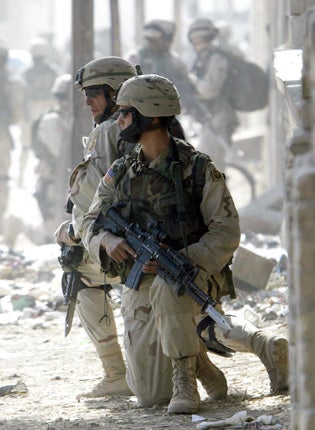Obama finally delivers on pledge to end the war in Iraq
Combat troops to be withdrawn this month despite deteriorating security

Proclaiming a key campaign promise kept, Barack Obama yesterday announced that the US combat mission in Iraq would end as scheduled this month, leaving a transitional force of 50,000 that in turn will be out of the country by 31 December 2011.
"As a candidate to the presidency, I pledged to bring the war in Iraq to a responsible end," President Obama told a gathering of disabled war veterans in Atlanta. "And that's exactly what we are doing, as promised and on schedule."
Mr Obama's words came despite an apparently deteriorating security picture in Iraq – fuelled by continued political deadlock that has prevented formation of a new government in Baghdad since the inconclusive parliamentary elections in March – and mixed progress in the training of Iraqi forces who are supposed to take over when the Americans have left.
But Mr Obama was undaunted. Internal violence, he insisted, was near its lowest level since the US-led invasion of 2003. "We have closed or turned over hundreds of bases and moved millions of pieces of equipment out of the country."
Most important of all, in terms of wrapping up a conflict that almost two thirds of Americans now oppose – and one that candidate Obama described as a "dumb war" – over 90,000 troops will have been brought home since his inauguration in January 2009.
"Make no mistake, we haven't seen the end of our sacrifices in Iraq," he told the veterans, but the mission was about to change. The drawdown means not only fewer troops overall are serving in Iraq and Afghanistan now than when Mr Obama took office. For the first time since 2003, the force in Iraq will be smaller than in Afghanistan, where Mr Obama's surge is almost completed.
By September, after the withdrawal of combat troops from Iraq, there will be 146,000 troops on the ground in both countries, compared to 177,000 in January 2009. Almost 100,000 of them will be in Afghanistan.
The 50,000 in Iraq, officially described as "advisers", will have the job of training up Iraqi forces, conducting counter terrorist operations and providing security for ongoing reconstruction projects. If all goes to plan, they too will be out in 17 months time.
But that is a big "If", as a dispute over the number of Iraqi civilian casualties last month shows – a dispute that underlines the diverging priorities of the Obama adminstration and Iraq's own feuding politicians, struggling to prevent sectarian strife from boiling over anew. For the White House, anxious to keep to the withdrawal timetable and direct its entire attention to Afghanistan, "only" 222 civilians were killed last month; the Iraqi authorities, however, announced that 535 died, a figure that would make July the deadliest single month in two years. August has got off to a scarcely less bloody start: two bombings and a drive-by shooting killed eight people yesterday.
But the ultimate cost of the war – and final judgement on whether it was worth it – may not be known for many years. Thus far, budgetary outlays total over $700bn (£440bn), but some economists warn that figure could triple to $2trillion (£1.25trillion) or more once the cost of long-term medical treatment for the wounded, equipment replacement and interest payments on the money borrowed to pay for the war is factored in.
In human terms, over 4,400 US troops have been killed since 2003, while the civilian toll as a result of the invasion could run into the hundreds of thousands. Millions more Iraqis, for a time at least, fled as refugees into neighbouring Jordan and Syria, at the height of the insurgency and sectarian fighting.
But the immediate caculations for the Obama administration are political. Not only does confirmation that the Iraqi pullout is on track allow the President to boast of a promise fulfilled, when dissatisfaction over the economy is sapping his popularity.
The White House will also point to Iraq as proof that self-imposed deadlines can be kept and that the US will also be able to extract itself from Afghanistan – where American soldiers have been fighting even longer, since October 2001, and where many experts warn the war is unwinnable.
Mr Obama warned yesterday that "huge challenges" would continue in Afghanistan. But he declared nearly all the extra 35,000 troops earmarked for Afghanistan in last year's surge were in place, with objectives and goals that were "clear and achievable."
On the civilian front, meanwhile, the US-led coalition was taking steps to reduce corruption and promote more responsible government.
In theory, the pull-out of US forces in Afghanistan will begin in mid-2011. But training loyal and effective Afghan troops to replace Americans is proving even more difficult than in Iraq, and Robert Gates, the Defense Secretary, has indicated that any initial withdrawal will be symbolic at best.
Join our commenting forum
Join thought-provoking conversations, follow other Independent readers and see their replies
Comments
Bookmark popover
Removed from bookmarks